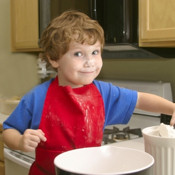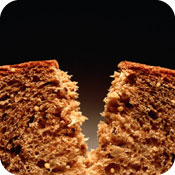 When cooking on the stove top, turn all pot and pan handles toward the back of the stove to help prevent a child's arm or head from knocking it over.
When cooking on the stove top, turn all pot and pan handles toward the back of the stove to help prevent a child's arm or head from knocking it over.
Wear aprons, roll up sleeves and tie hair back to reduce messes, spills and the risk of fire.
Teaching proper cutting skills is important. Begin with a plastic knife and show kids how to cut away from their bodies.
Keep a sturdy stool nearby so your child can easy reach counters.
Keep oven mitts or hot pads handy at all times. A handle that feels lukewarm to you may be too hot for a youngster.
If somebody does get burned, run it under cold water immediately. Do not place butter or oil on a burn. Consult a doctor if you are uncertain about the severity of the injury.
Don't assume your children know how to operate kitchen appliances and utensils. When they're first learning to use can openers, vegetable peelers, and eventually blenders or mixers, make sure to walk through safe tool use step-by-step.
Now that your kitchen is safe, call in the kid and get to the fun stuff! It's best to set up an area that your children can call their own. If you're in a hurry, this tactic contains the mess, and it also makes them feel special while cooking.
Perfect tasks for young children (about 2-3 years old) include washing fruits and vegetables, pouring pre-measured ingredients into a bowl or pan, mixing ingredients or tearing lettuce. When letting a child stir, it's better to make sure all dry ingredients (flour, sugar, etc.) are sufficiently moist before handing the bowl over. This will prevent "powder poof" messes.
Older children (4-5 year olds) with more muscle control and coordination can begin to take part in more challenging tasks. Squeezing lemons and limes, cracking eggs, cutting soft foods like mushrooms or cheese with a plastic knife, or mashing soft fruits and veggies with a fork. Teach them how to use a potato masher, a grater or a whisk. Short, simple tasks are great for kids. Their short attention span will be kept while performing their assignments, and you'll be able to compile more difficult portions of the meal while they work.
Make sure your little chef knows that a cook's job isn't done when the timer dings. Cleanup is just as important as cooking. Have your kids wipe counters, pile dishes, toss waste or put away ingredients after you're done assembling your meal or snack.
Continued ›
|







Member Comments